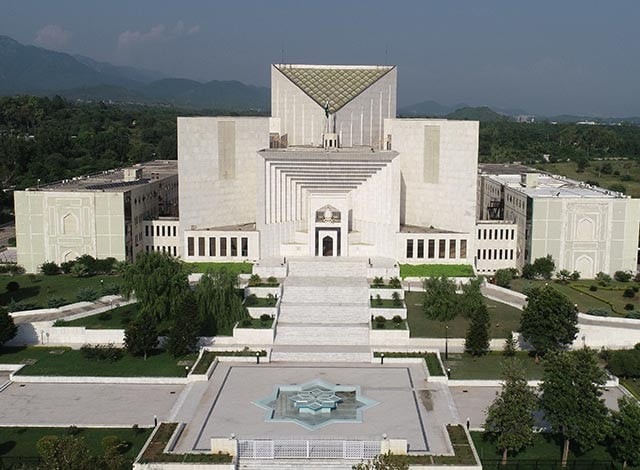SC questions Faizabad commission’s impartiality
Says three-member inquiry panel exceeded its mandate

The Supreme Court has raised serious questions about the impartiality of an inquiry commission that probed the TLP’s November 2017 sit-in in Islamabad and gave a clean chit to Inter-Services Intelligence (ISI) former chief Lt Gen Faiz Hameed in its report.
A three-member bench led by Chief Justice Qazi Faez Isa is holding proceedings for implementation of the court’s February 2019 order in the sit-in case.
The court on Saturday unveiled a written order of its May 6 proceedings, stating that the three-member commission “went out of its way and mandate, to insist that a particular person [Hameed] had done no wrong by relying on his paper denial, while discounting the testimony on oath against him by another.
“And it did so without providing an opportunity for cross-examination. It also did not explain why it preferred the statement of one against the testimony of the other. Demonstrating such bias further compromised the commission's impartiality,” it said.
In view of the SC’s February 6, 2019 order also authored by Justice Isa, the caretaker government had constituted an inquiry commission on November 15, 2023, and stipulated its terms of reference (ToRs).
Led by Dr Syed Akhtar Ali Shah, a retired inspector general of police (IGP), the commission comprised Tahir Alam Khan, also a retired IGP, and Khushal Khan, a serving additional secretary of the interior ministry.
The commission submitted its 1049-page report on March 6.
In its report, the commission gave a clean chit to spy agencies as well as former ISI chief Lt Gen (retd) Faiz Hameed, stressing that high-ups of the PML-N government of that time did not accuse officials of spy agencies of facilitating the TLP protestors.
Instead, the commission held the political leadership, including the then Punjab chief minister – now the prime minister – Shehbaz Sharif, among others, responsible for letting the TLP protestors enter Islamabad without any resistance due to “apprehension of losing their vote bank”.
Commenting on the report, the SC noted that the commission ventured into areas which were beyond its ToRs, adding that the extensive report “is replete with clichés, platitudes, and homilies, often as a substitute for substance.”
“We also note that not all were treated alike; statements of some were recorded on oath and others were sent questionnaires. Surprisingly, none from the TLP were called nor their statements recorded.”
The court noted that the commission incorrectly assumed that the right to travel to Islamabad and to protest there is prohibited, adding that the SC’s February 2019 judgment had stated the very opposite.
“It [the judgment] has recognized the people's right to assemble and protest, provided it is peaceful and complies with the law which may impose reasonable restrictions in the interest of public order.”
It said the commission also did not consider other aspects of the SC judgment and subsequent orders.
“It is disappointing to note that an element of provincialism crept into the report. And, most surprisingly the commission castigated those at the political helm while disregarding and/or exonerating the perpetrators of violence.”
The court noted that even Attorney-General for Pakistan (AGP) Mansoor Awan had endorsed that the report lacked substance and by and large the ToRs were not attended to or not taken into consideration.
“Let the learned AGP file a response on behalf of the Government of Pakistan to the said report and also to obtain instructions whether the government wants the commission's report to be made public,” it added."



















COMMENTS
Comments are moderated and generally will be posted if they are on-topic and not abusive.
For more information, please see our Comments FAQ